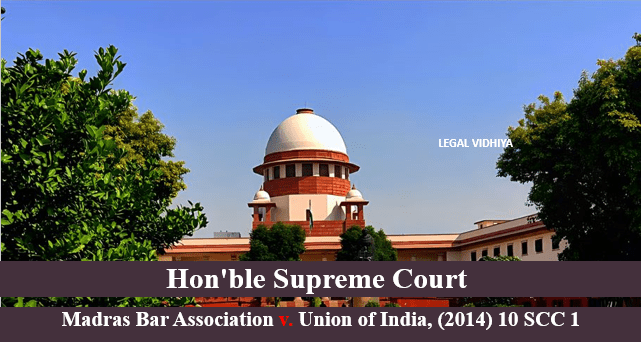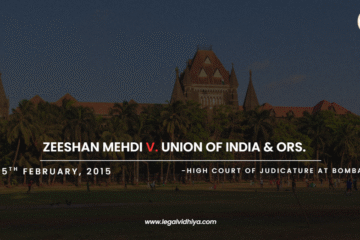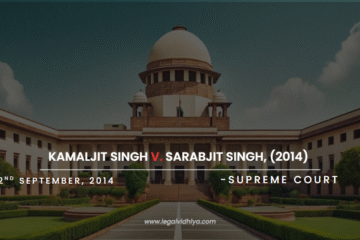
| Citation | 2014 SCC |
| Date of Judgment | 25/09/2014 |
| Court | Supreme Court of India |
| Appellant | Madras Bar Association |
| Respondent | Union of India |
| Bench | Chief Justice, Jagdish Singh Khehar, J. Chelameswar, A.K. Sikri, Rohinton Fali Nariman |
| Referred | Article 14, 21, 50 |
| Case Type/ Issue | Writs Petition/ Constitution |
FACTS OF CASE
The case of Madras Bar Association vs Union of India was a significant one. Here are the key facts:
- The case was a judicial challenge to the Central Legislature’s attempt to determine and regulate the functioning of tribunals.
- The President of India promulgated an Ordinance on 4th April 2021, on the recommendations of the Central Government. This was done while exercising powers under Article 123 of the Indian Constitution.
- The Ordinance titled, the Tribunals Reforms (Rationalisation and Conditions of Service) Ordinance, 2021, called for amendments in as many as nine statutes.
- The aim was to replace the existing tribunals with High Courts, established under each of these statutes. This was due to poor adjudication of disputes coupled with delay in dispensing justice.
- The ‘judicial independence’ of such tribunals was questioned, as they were claimed to be working under the influence of the executive by many Advocate Bar Associations.
ISSUE
The main issue in the case of Madras Bar Association vs Union of India revolved around the constitutional validity of the National Tax Tribunal Act, 2005 and the Constitution (Forty-second Amendment) Act, 1976.
The key points of contention were:
- Whether High Courts, which discharge judicial functions, can be substituted by an extra-judicial body..
- The ‘judicial independence’ of such tribunals was questioned, as they were claimed to be working under the influence of the executive by many Advocate Bar Associations.
- The Ordinance was also challenged on the grounds that it was violative of the Theory of Separation of Powers, which is an integral part of the Basic Structure of the Indian Constitution.
- The amendments to the Finance Act were also challenged for compromising the independence of the judiciary.
ARGUMENT
The arguments in the case of Madras Bar Association vs Union of India were as follows:
- Arguments by the Petitioner (Madras Bar Association): The primary argument against the challenged provisions in the Act was that it had illegally reversed earlier rulings of the Court.. Senior Advocate Arvind Datar, leading the arguments for the Madras Bar Association, contended that the said Ordinance was violative of the Theory of Separation of Powers, which compromises the independence of the judiciary and is a fundamental component of the Indian Constitution.
- Arguments by the Respondent (Union of India): The respondent’s arguments are not explicitly mentioned in the search results. However, it can be inferred that they would have defended the constitutionality of the National Tax Tribunal Act, 2005 and the Constitution (Forty-second Amendment) Act, 1976.
The case raised important questions about the role and functioning of tribunals in India, and whether High Courts, which discharge judicial functions, can be substituted by an extra-judicial Body.
JUDGEMENT
The judgement in the case of Madras Bar Association vs Union of India was delivered by the Supreme Court of India on 25th September, 2014.
The court upheld the constitutional validity of the National Tax Tribunal Act, 2005 and the Constitution (Forty-second Amendment) Act, 1976.
However, it was also held that the qualifications of Technical Members of NCLT/NCLAT suffer from the same vice as the one upheld earlier and are, therefore, invalid.
The court ruled that High Courts, which discharge judicial functions, cannot be substituted by an extra-judicial body. It also emphasized that the independence and fairness of an adjudicatory authority are sine qua non.
This judgement has had significant implications for the role and functioning of tribunals in India.
References
Written by Ziya Praveen an intern under legal vdihiya.




0 Comments